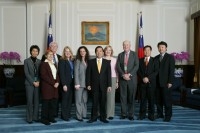News & activities
 News releases
News releases

President Chen Shui-bian received the "2006 Asia Pacific Journalism Fellowships" winners on March 14 at the Office of the President, reassuring to the guests his firm belief in peace, democracy, freedom of the press, human rights, and Taiwan's prosperity.
March 14, 2006 marked the anniversary of China's passage of the Anti-Separation Law. At the same time, it would have been the fifteenth anniversary of the implementation of the National Unification Guidelines if its application had not been ceased. Also, the year 2006 is the tenth anniversary of the cross-strait missile crisis since 1996.
The president especially showed his worries over the Chinese Anti-Separation Law, regarding it as China's "de jure invasion" of Taiwan. The president also warned the guests and the international community that, according to military intelligence, the Chinese government has made a three-phase plan to attack Taiwan. "By the end of 2007, 2010, and 2015, China will have respectively completed its preparations for contingent wars, all-out wars, and decisive wars," the president said.
Therefore, the president told the guests, "Even China does not, and is not willing to practice democracy and observe international norms, it is by no means entitled to oppose Taiwan's democracy. China's denial and refusal of Taiwan's democracy can never justify its use of arms in threatening Taiwan's democracy."
To emphasize Taiwan's democracy to the guests, the president then referred to the ceasing of the National Unification Council and its Guidelines, and indicating its three significances: to further deepen Taiwan's democracy, to respect public opinions, and to insist on Taiwan and its citizens' free will to choose.
As to the issues of human rights and freedom of the press, the president cited to the guests the reports made by the US Department of State, the Reporters Without Frontiers, and the Freedom House, and pointed out China's notoriety in human rights violations. "Contrary to China," the president stressed, "Taiwan, in line with the Western World, is a country where the people enjoy human rights and the freedom of the press."
To show his respect to freedom of the press, the president answered the guests' questions in four aspects: political goals setting, Taiwan's future, global economic dependence on China, and cross-strait trade.
In regard to Taiwan's goals in international politics, the president emphasized again the sovereignty of the country and that of the people. He said, "By the people's consensus, nothing will be excluded from being possible. The fact that Taiwan is neither a political entity nor a local government of China but a sovereign country will forever stand. I hope Taiwan will have already been a member of the World Health Organization and of the United Nations 20 years later from now."
To answer the question regarding Taiwan's future, the president reiterated the people's choice. "In order to respect people's right to choose, nothing can be set as the ultimate goal. Taiwan's citizens will decide what this country's future will be like by reaching their popular consensus," said the president.
The president then took up the cross-strait trade issues and related them with the global dependence on China in terms of economy. The president worried that too much economic dependence on China, particularly that from the United States of America, would tend to alter the cross-strait status quo. "According to the Taiwan Relations Act, the United States is obliged to assist in defending Taiwan; we, however, are clearly aware of the importance of self-defense, which will lead us to raise our national defense budget to the level of 2.85% and 3% of the GDP respectively by the end of 2007 and 2008," the president told the guests.
To conclude the meeting, the president stressed again that "To provide a peaceful climate for cross-strait trade, China should be solely held responsible, for it has always been raising a hatchet to threaten Taiwan, attested by its expanding missile deployment and passage of the Anti-Separation Law."
The winners of the 2006 Asia Pacific Journalism Fellowships were:
Reginald G. Henry, Pittsburgh Post-Gazette
Susan J. Albright, Star Tribune
Stephanie Genkin, CNN
Laura Lorek, San Antonio Express-News
Jessica Smith, KQED
David Whiting, Orange County Register


